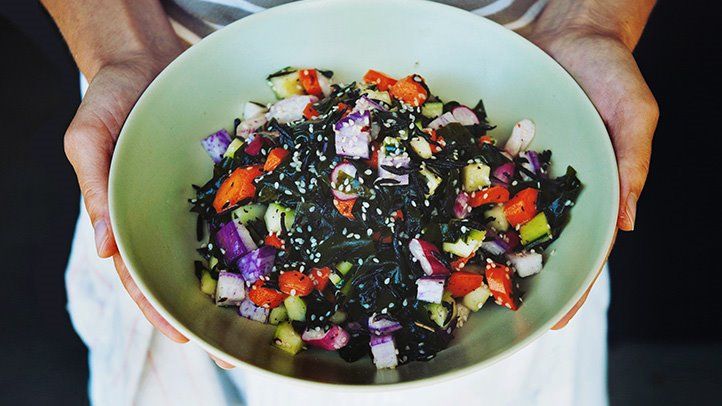Managing Hypothyroidism Naturally Through Diet and Lifestyle Choices

As with any chronic condition, hypothyroidism requires regular medication to relieve symptoms and prevent future complications. But can other daily choices also improve your health and well-being?
It turns out they can. While eating certain foods and maintaining an exercise regimen won’t cure hypothyroidism or suffice as treatment, smart diet and lifestyle choices can help.
“Since hypothyroidism is an autoimmune disease, diet alone probably won’t cause hypothyroidism, but it plays a big role once someone is diagnosed,” says Natalie Rizzo, a registered dietitian based in New York City.
For starters, consider the effect that hypothyroidism can have on weight. Hypothyroidism (also called low thyroid or underactive thyroid) is marked by insufficient hormone production in the thyroid — the butterfly-shaped gland located at the bottom-front of your neck. This gland affects the body’s metabolic processes, and often, sudden weight gain is an early sign of low thyroid.
It’s obvious that what you put into your body matters when you’re managing hypothyroidism. “Making sure you eat a healthy diet is vital to maintaining a healthy weight,” Rizzo says.
Similarly, exercise can complement your hypothyroid treatment plan by helping you manage stress, reduce symptoms of depression (which can sometimes be associated with uncontrolled hypothyroidism), and maintain a healthy waistline.
Read on to learn more about some of the best and worst foods for hypothyroidism, as well as some of the ways exercise can help you manage the disease.
What to Eat if You’re Managing Hypothyroidism
When you research the best foods for hypothyroidism, you’re not likely to come up with any surprising selections. “There is no one food that will increase your thyroid hormone, but there are foods that a person with hypothyroidism should eat more of,” Rizzo says.
The following are some foods that contain important vitamins and nutrients for hypothyroidism:
Iodine
While iodine deficiency is relatively rare in the United States because of Americans’ high consumption of dairy and salt, people in other countries may need to up their intake of iodine.
Megan Casper, RDN, a dietitian based in New York City, points out that iodine deficiency is the leading cause of hypothyroidism worldwide. This mineral can’t be made by the body, so dietary sources like iodized salt, dairy products, seafood, seaweed, and fortified cereals are important.
“Iodine is an essential nutrient in the body, and thyroid hormones are composed of iodine,” says Rizzo. “Those lacking thyroid hormones may also be lacking iodine.”
The recommended daily amount of iodine is 150 micrograms (mcg) — less than half the amount in a teaspoon (tsp) of iodized salt. (1) If you and your doctor have determined you’re getting enough iodine, don’t supplement your diet, because this could worsen your condition. (2)
Tyrosine
As with iodine, you’ll want to talk to your doctor to see if you would benefit from eating more foods with tyrosine or taking a supplement. That’s because this amino acid has the potential to interact with hypothyroidism medication.
But considering its role, you will want to make sure you’re getting enough of the amino acid: Together with iodine, tyrosine makes the thyroid hormone. (3)
Foods with tyrosine include seaweed, turkey, eggs, and cottage cheese. (4)
Vitamin D
“Most people with hypothyroidism are deficient in vitamin D, but the mechanism for this is unknown,” Rizzo says. Adequate vitamin D in your diet can help prevent illnesses linked with vitamin D deficiency such as bone loss and malformations.
Foods rich in vitamin D include eggs, fatty fish like wild-caught salmon, and dairy products such as Greek yogurt.
Antioxidants
Antioxidant-rich fruits and veggies are known to help fight disease, (5) but having hypothyroidism means you have another reason to load up on these superfoods. That’s because these foods fight oxidative stress, a state of increased inflammation that’s associated with hypothyroidism and other chronic diseases. (6)
To get your fix of antioxidants, reach for berries, nuts and seeds, and dark-green leafy veggies, such as spinach and kale.
Selenium
“The highest concentration of selenium is found in the thyroid gland, and it’s vital to the enzymes that help the thyroid function,” Rizzo says. “Many people with hypothyroidism may be lacking in this important nutrient, which has a large effect on the immune system, cognitive function, and fertility.”
Seafood, eggs, seeds, and nuts are all valuable sources of selenium.
If you’re taking a supplement, keep in mind that the Cleveland Clinic cautions against taking more than 200 milligrams (mg) of selenium per day. (2)
Vitamin B12
“Many people with hypothyroidism suffer from B12 deficiency, but the mechanism for this is also unknown,” Rizzo says. You may be at risk of deficiency if you follow a vegan diet, so consider talking to your doctor about supplementation.
Or load up on foods high in vitamin B12. Poultry, fish, and meat are all good sources.
Foods That May Worsen Hypothyroidism Symptoms
While certain nutrients are beneficial to thyroid health, others can interfere with thyroid function.
Below are some of the foods you should be mindful of if you’re living with low thyroid.
Cruciferous Vegetables
You may have read that green, leafy veggies like kale, bok choy, broccoli, and Brussels sprouts can make hypothyroidism worse. But before you keep reading, ask yourself a question: Do you live in the United States? That’s key — because if you do, you likely don’t need to worry about these cancer-fighting veggies messing with your hypothyroidism management. (7)
“Cruciferous vegetables do release a compound called goitrin, which can interfere with the synthesis of thyroid hormones,” says Rizzo. “However, research shows that this is only a problem when accompanied by iodine deficiency, and cooking these types of veggies denatures the goitrin compound.”
Again, iodine deficiency is uncommon in the United States and is more prevalent in other countries, so be absolutely sure to talk to your doctor before eliminating cruciferous veggies from your diet.
Foods With Excess Sodium
People with hypothyroidism are at an increased risk for high blood pressure, and many processed foods (those found in the frozen-food aisle, plus french fries, potato chips, and the like) can contribute to high blood pressure because of their high salt content.
That doesn’t mean you can’t have a salty snack every now and then — just stick with the American Heart Association’s recommendation for daily sodium intake: ideally a max of 1,500 mg. (8)
Soy
Rizzo says some healthcare providers recommend omitting soy altogether, but often it’s safe to consume in small amounts. In fact, foods with soy — like soy milk, edamame, soybean flour, and miso — may even help slightly lower your LDL, or “bad,” cholesterol levels, thereby improving your heart health. (9)
If you’re managing hypothyroidism, avoid eating soy around the time you take your synthetic thyroid replacement (the most common hypothyroidism treatment). The Mayo Clinic recommends waiting four hours after taking your medication before consuming soy. (10)
Walnuts, Cottonseed Meal, and Other Foods and Supplements
Other foods can also interact with your synthetic thyroid medications, so you shouldn’t eat these in the mornings when you take your prescription. In addition to soy, these include:
- Walnuts
- Cottonseed meal
- Iron supplements or multivitamins with iron
- Calcium supplements (11)
Also, be mindful of taking antacids with magnesium or aluminum, cholesterol-lowering drugs, and some ulcer medications, as these may affect absorption of your synthetic thyroid replacement.
Lifestyle Tips to Better Manage Hypothyroidism
Stress and lack of exercise aren’t good for anyone’s health. When it comes to the sluggishness, depression, and slowed metabolism from hypothyroidism, neglecting healthy lifestyle habits may worsen hypothyroid symptoms.
Taking time for yourself is important in controlling stress and depression symptoms. For even more benefits, you can try meditation or a yoga class.
You also shouldn’t neglect exercise. “Exercise at least 150 minutes per week,” suggests Rizzo. “It helps with weight maintenance!” The key is to start off slow with an exercise regimen, whether you’re completely new to exercise or haven’t been active for a while. Certain low-impact, energy-boosting routines, such as tai chi, can also help. (12)
The Takeaway: Following a Hypothyroidism ‘Diet’ and Lifestyle
While certain dietary and lifestyle measures can help you lose extra pounds and maintain a healthy weight, there really is no such thing as a specific diet or best lifestyle for hypothyroidism.
Managing stress, exercising regularly, and keeping hypothyroidism-friendly foods in mind can help improve your health; ultimately, following tried-and-true health advice and your medication schedule will all work in your favor.
Rizzo puts it simply: “If you eat a diet that emphasizes portion control and plenty of lean proteins, vegetables, fruits, heart-healthy fats and omega-3s, and high-fiber foods, you should be able to manage your condition.”
Additional reporting by Melinda Carstensen.
Common Questions & Answers
Everyday Health follows strict sourcing guidelines to ensure the accuracy of its content, outlined in our editorial policy. We use only trustworthy sources, including peer-reviewed studies, board-certified medical experts, patients with lived experience, and information from top institutions.
Resources
- Iodine Deficiency. American Thyroid Association.
- Thyroid Issues? What You Should Know About Foods and Supplements to Avoid. Cleveland Clinic. October 8, 2019.
- Hypothyroidism. Mount Sinai.
- Foods Highest in Tyrosine. SELF NutritionData.
- Antioxidants: In Depth. National Center for Complementary and Integrative Health. November 2013.
- Mancini A, Raimondo S, Di Segni C, et al. Thyroid Hormones and Antioxidant Systems: Focus on Oxidative Stress in Cardiovascular and Pulmonary Diseases. International Journal of Molecular Sciences. December 2013.
- Cruciferous Vegetables and Cancer Prevention. National Cancer Institute. June 7, 2012.
- How Much Sodium Should I Eat Per Day? American Heart Association. November 1, 2021.
- Soy. National Center for Complementary and Integrative Health. December 2020.
- Soy: Does It Worsen Hypothyroidism? Mayo Clinic. October 5, 2021.
- Hypothyroidism Diet: Can Certain Foods Increase Thyroid Function? Mayo Clinic. June 1, 2021.
- Complementary and Alternative Medicine in Thyroid Disease (CAM). American Thyroid Association.

Bhargavi Patham, MD, PhD
Medical Reviewer
Bhargavi Patham, MD, is board-certified in internal medicine as well as endocrinology, diabetes, and metabolism. She is currently practicing academic medicine at Houston Methodist Hospital in Texas.
Patham received her Bachelor of Medicine and Bachelor of Surgery degree from Government Medical College in Nagpur, India. She received her PhD in cell biology from the University of Georgia in Athens in 2005, and then completed two years of post-doctoral training in immunology at the Yale School of Medicine in New Haven, Connecticut.
Patham completed her residency in internal medicine at the Texas Tech University Health Sciences Center in El Paso, where she was previously an assistant professor of pathophysiology and cell biology at the Paul L. Foster School of Medicine. She completed her endocrinology, diabetes, and metabolism fellowship at the Baylor College of Medicine in Houston.

Kristeen Cherney, PhD
Author
With a doctorate in English (rhetoric and composition), Dr. Cherney focuses her academic scholarship on the intersection between disability and literacy. She also holds a Master of Arts in English and a Bachelor of Arts in communication.
Cherney has contributed to the books The Wiley Handbook on Violence in Education: Forms, Factors, and Preventions, Composing in Four Acts: Readings for Writers, and Georgia State University's Guide to First-Year Writing, as well as to scholarly journals like Praxis, the Journal of Teaching Writing, and the Journal of Dracula Studies.
Cherney enjoys running, meditating, hiking, and paddleboarding.

